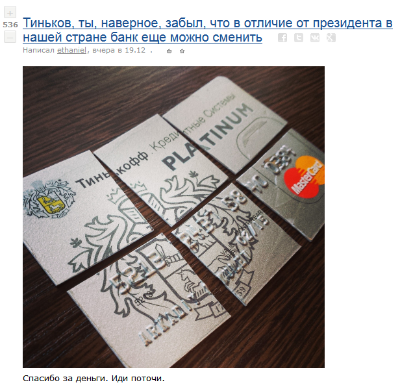Voronezh entered into a contract with the bank, making their changes, and is going to sue 24 million rubles
 Probably, there is no person who would not be annoyed that the most important clauses in contracts are always written in small print.
Probably, there is no person who would not be annoyed that the most important clauses in contracts are always written in small print.But, knowing this, time after time, many people sign papers without having read them carefully, and pay commissions they were not aware of.
A 42-year-old resident of Voronezh found an ingenious way to turn this feature in his favor and now, taking advantage of the carelessness of bankers, is going to sue 24 million rubles from them.
In 2008, a resident of the regional center received a letter from Tinkoff Credit Systems CJSC inviting them to use a credit card. For its execution it was necessary to fill out an application form and send it to the address indicated.
')
Voronezh scanned the form and changed the conditions proposed by the bank, in the very part with small print. He pointed out that the interest rate for the use of the loan and the commission for issuing cash amounts to 0%, and “the client has the right not to pay all the commissions and fees stipulated by the tariffs”. In addition, instead of the bank's address www.tcsbank.ru, Voronezh indicated its website www.tcsbank.at.ua , confirming that “it has been familiarized with the General Terms and Conditions and the Tariffs available on the Internet”. In other words, he ordered an unlimited and interest-free loan.
Separately, the contract on its website provided for cases where the bank violated the terms of the document. “The Bank is not entitled to make changes and additions to these General Terms and Conditions unilaterally. In the event of a change, amendment, replacement of the General Conditions unilaterally by the Bank, the Bank pays compensation to the Customer in the amount of 3,000,000 (three million) rubles, for each new change, addition, replacement of the General Conditions, ”the client indicated. Compensation from the bank upon termination of the contract unilaterally was set at 6 million rubles.
Soon the legally savvy client received from the bank an approved copy of the application form and a credit card. This meant that the bank agreed to the proposed conditions. Apparently, the bankers signed the document, without reading, without knowing that the client offered them his conditions.
The bank terminated the contract with Voronezh in April 2010, since, in the opinion of TCS, the client began to admit the delay in payment of the minimum payment. Two years later, Tinkoff Credit Systems CJSC went to court to recover standard delays, fees and fines from the former client. Voronezh, having paid only the amount of the principal debt, filed his lawsuit, demanding from the bank 24 million rubles compensation for violation of the points of the loan agreement concluded on its terms.
Now Voronezh has good chances to win a lawsuit against the bank. If only because the court had previously recognized as lawful the contract that the parties entered into. According to this decision, the contract drawn up by the client is recognized as legal.
So,% username%, always carefully read the small print. Even if you are a bank :)
[ from here ]
Upd 1: Link to the forum where the issue is discussed.
In the comments suggested a link to the forum where the question is discussed:
Good afternoon, colleagues. I propose a discussion on the topic: is it possible to recover from the bank the amount indicated in the title. Claim to the bank has already been sent. Situation: the client receives by mail from a company affiliated with a bank, an application form (offer), which specifies the conditions for issuing a credit card. the client does not agree with such conditions by sending his conditions to the company - 0% per annum, no commissions, penalties, forfeits, sets no limit, indicates that the repayment period is not fixed, etc. etc. The client also creates a website where he places the General Conditions and Tariffs, by including clauses on prohibiting the bank to unilaterally change, replace, supplement the General Conditions and Tariffs, providing for these actions compensation in a fixed sum of 3,000,000 rubles for each change, replacement, addition to the General Conditions and Tariffs. Sends an application form to the company, she sends it to the bank. The bank issues a credit card in the name of the client with the established limit, i.e. accepts the offer by committed actions. The client activates the card and uses it, periodically depositing amounts into the card’s account. After some time, the bank files a lawsuit against the client for termination of the loan agreement, recovery of the amount of debt, interest, penalties, fines, etc. And here in court the above described moment turns out. The court in the decision indicates that the contract was concluded on the terms of the client, not the bank. The decision passes the appeal and enters into legal force, and a claim is sent to the Bank to pay compensation for violations of the General Conditions and Tariffs.
As you, colleagues, understand, it is useless to search for practice in such matters. Therefore, the question is: what are the weaknesses in this issue? I must say that 159 of the Criminal Code is not even close here. On the application form, the seal of the bank and the signature of the official. Can the court apply 333 GK, even though the legal nature of the penalty does not fall under the wording of compensation. We will be very grateful for specific thoughts.
Upd 2: Tinkov Reaction.
Upd 3: Article with expert comments.
Article with expert comments in the "Vedomosti":
“The case is curious, but isolated, there are no others and there will not be, since all documents received by the bank are subject to multiple checks,” insists TKS-bank representative Oleg Anisimov, explaining what happened in 2008 with a “one-time technical failure”. Discuss the claim and the name of the plaintiff, he did not. But later a representative of the bank clarified that the amount of the claim amounts to 900,000 rubles. “The client regularly received extracts and paid interest on our rates, and not on their own. We terminated the contract because it ceased to fulfill its obligations under our contract, ”says Anisimov. “People who forge documents of banks are at great risk of being prosecuted,” he warns. - In the actions of the borrower there are signs of fraud, we communicate with law enforcement agencies in this regard. "
Experts consider these threats to be empty. The chief lawyer of the Renaissance Loan, Sergey Korolev, has never heard of such cases: “The bank apparently did not check the documents it receives from the client, although banks usually have a special service that checks all documents received from the borrower.” According to the Civil Code, fines and penalties are levied for breach of contractual relations, but in this case the bank only exercised the right to terminate the contract and make changes to the tariffs, and Korolev is inclined to believe that the court should not satisfy the claim in such a volume. And cites as an example the situation in 2004, when Alfa-Bank introduced a commission for early termination of the deposit agreement: "Then many clients sued the commission for precisely this reason." The bank may also state that the borrower is also abusing his right, which is prohibited in our country, he adds. But in his opinion, the prospects for returning interest from the bank are few: “The maximum that he can try to get through the court from such a client is compensation for using money at the rate of the Central Bank.”
“Changing a loan agreement by a client is an interesting judicial precedent, but in this case, the probability of a decision in favor of a client is small,” says First Deputy Chairman of the Board of Trust Bank Yevgeny Tutkevich. - Usually the powers of the branch director and the more so an ordinary bank employee are limited to signing only standard loan agreements. In the place of the TCA, I would challenge the authority of an employee of a bank who signed such an agreement outside of his authority, and demanded that the agreement be declared invalid by the court. ”
Upd 4: Interview with the hero of the occasion.
Upd 5: Opinions of lawyers on the case.
Legal opinions on the case:
Lawyer, St. Petersburg
Lawyer, Orenburg
Lawyer, Yaroslavl
Hello, a fine case, in the texts of the articles it is indicated that they don’t look, all the more knowing that they prescribe their nasty conditions in small print and that most of them do not read them.Malyhin Vladimir Viktorovich
Bravo, great action.
To all appearances, the bank will only have to declare about 333, about disproportion of fines.
There is no deception, the text is changed, i.e. just an editorial board, but the bank inattention is no longer a problem of the borrower.
Lawyer, St. Petersburg
Alexey, hello!Popov Vadim Andreevich
In general, everything turned out gorgeous, I applaud standing to this man!
As for specific issues, there was no legally formal replacement of the contract, there was a new offer to a citizen bank.
443 of the Civil Code
The answer to agree to conclude an agreement on conditions other than those proposed in the offer is not an acceptance.
Such a response is recognized as a refusal to accept and at the same time a new offer.
Everything else is already a bank problem, it turns out that they themselves have not controlled
The prospect of foreclosure is rather vague. On the one hand, there is a prejudicial act, and on the other hand, the statute of limitations expired in this case. Therefore, we must look, but 100% I can say that there are chances and not the smallest.
Lawyer, Orenburg
good day!Trifonova Julia
really unique case!
firstly, the contract was really not a substitute, the citizen offered his own terms on which he is ready to conclude an agreement, and the Bank accepted such conditions. The substitution of the contract would be if he forged the contract, which was already signed by an employee of the Bank. And so, in accordance with Article 421 of the Civil Code of the Russian Federation, the parties are free to enter into contracts.
As for the chances to recover 24 million, here it will depend on the discretion of the court.
According to Article 200 of the RF Civil Code, the limitation period begins to run from the moment when the person learned or should have known about the violation of his right.
The bank claims that it terminated the contract on April 19, 2010, as it informed the consumer on May 6, therefore, it believes that the statute of limitations has expired.
In my opinion, in accordance with Article 450 of the RF Civil Code, only the court can terminate the contract in violation of the terms of the contract by the other party, and accordingly, the limitation period must be calculated from the moment the decision was made by the justice of the peace from 6.09.2012, which entered into force in December 2012, therefore, the statute of limitations is not missed, and, accordingly, there are chances for recovery. The Bank can be saved only by Art. 333 of the Civil Code of the Russian Federation on non-compliance of the amount of the penalty to the violation of the obligation.
Lawyer, Yaroslavl
Upd 6: Topics of the Voronezh.
Here , probably, the topic of the Voronezh himself:
In principle, everything is simple. After taking lessons from the BRS with their credit card, I sent the Tinkoff office by mail my offer saying that we send you the money (even though you immediately thought of not putting the card in the envelope as an IRU), but our country is free and considering that their conditions I was not satisfied with the offers, I registered my own, filled out a questionnaire with my requirements, the conditions on which I am ready to use their service, having signed it and sent it to the gentleman (not even hoping that they would answer and even more agree), but it was not there, THE CARD HAS RECEIVED! !! Well, of course, I was delighted with denyuzhku (I didn’t use it if I prescribed them in the conditions of 0% and just as foresightedly saw that if they change our conditions, then they pay me a penalty in the amount of 3 limos, well, there I wrote the address The site on which I posted YOUR agreement with Tinkov Bank. Also, in my statement to them (about the issue in my name of the card) I indicated that they had the right not to conclude an agreement on the conditions I specified, but the card was sent, it means they have arranged my conditions.
In connection with the violation of the concluded agreement, I want to sue them and get a penalty and fines.
I ask for help, since there is no branch in my city, can someone tell me in Moscow a competent, not particularly greedy lawyer? as well as a natarius who can certify the printed version of the contract from a specific Internet site address. Our natariusy say that they do not do this, in the city's notorial chamber they said that they do it only in Moscow.
As a prehistory, Tinkof wrote a court order in my name, which I successfully canceled, according to the judge, Tinkov’s representative died a little ... he ate after reading my signed statement (i.e., they had never even read it)
Upd 7: Voronezh is ready to sue for fraud charges.
Meanwhile:
Voronezh is ready to sue the bank representatives for fraud charges.

Tinkov continues to be rude to people on Twitter.

Some clients, due to the reaction of Tinkov, refuse TKS cards .

Voronezh is ready to sue the bank representatives for fraud charges.

Tinkov continues to be rude to people on Twitter.

Some clients, due to the reaction of Tinkov, refuse TKS cards .

Upd 8: Voronezh is leaving Russia because of Tinkov’s threats.
Voronezh, who tricks TCS-bank, has announced his emigration
“I came home last night, lawyers phoned me and told me about threatening statements by Tinkov. This is a man with his connections, money directly says that I will sit for four years. And I have a question: why four years, and not one, not two and not three? That is, the person has already spoken with someone, has given something to someone, and they have promised to put me in prison for four years? .. I apologize, but from now on I will not be in the Russian Federation anymore, ”said Slon in an interview resident of Voronezh.
Upd 9:
“The conflict is not constructive, so we decided to complete it in a gentlemanly way, by withdrawing mutual claims,” says Oliver Hughes, president of Tinkoff Credit Systems Bank.
[ source ]
Source: https://habr.com/ru/post/189328/
All Articles
